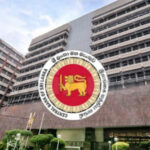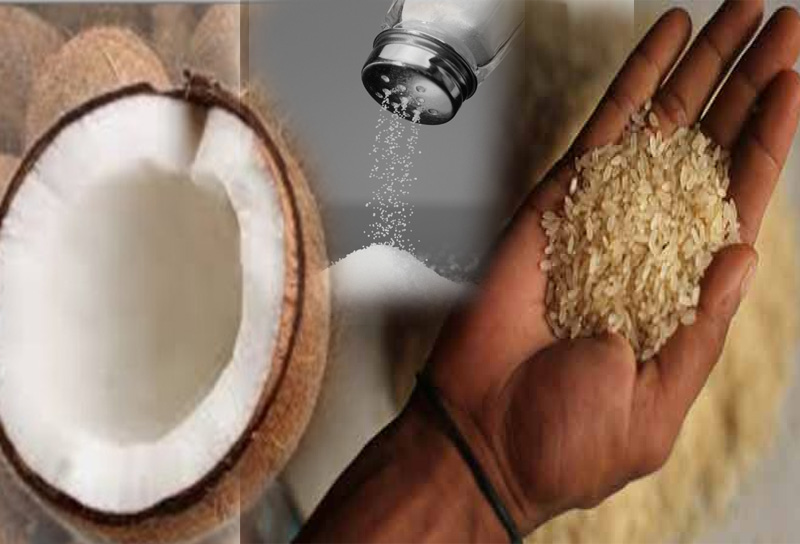
Wide Angle focuses on Sri Lanka’s Political Turmoil
- CNL Reporter
- January 26, 2025
- Weekly Political Review
- Wide Angle focuses on Sri Lanka's Political Turmoil
- 0 Comments
Weekly Political Review
Government Struggles in Rising Discontent, Security Concerns, and Public Trust
Rohana Jith
This week, the Sri Lankan government launched a series of strategic damage-control measures, aiming to deflect the public’s growing frustration with the high cost of living, shortages of essential goods like rice, coconuts, and salt, and the sky-rocketing prices that have left many struggling.
The ruling party ministers and several frontline MPs spent the week explaining the reasons behind the ongoing issues, focusing on the failure of governance that led to widespread public dissatisfaction.
Security Concerns and the Emergence of Gun Culture

A major development in Sri Lanka’s political landscape came when President Anura Kumara Dissanayake made shocking revelations about the rising gun culture in the country.
He disclosed that 73 T56 assault rifles from a Sri Lankan Army camp had fallen into the hands of underworld groups, raising serious concerns about national security. The weapons, which disappeared under the administration of former President Gotabaya Rajapaksa, have led to several arrests, though investigations are still ongoing.
This alarming incident highlights the escalating violence in Sri Lanka, particularly between gangs and criminal groups.
In 2024 alone, 103 people were killed in violent incidents, with a concerning spike in the last three months. Experts believe that political connections may be facilitating this rise in organized crime. As the death toll continues to rise, the public’s anxiety over the country’s security situation deepens.
About 13 people have been killed in armed clashes between gangs and criminal groups in the past three months alone. In 2023, 61 people were killed and 47 wounded. Experts believe the phenomenon is facilitated by political connections.
.In 2023, 61 people were killed and 47 wounded in more than a hundred shootings. According to the police, most of these incidents are related to disputes among underworld gangs, taking place in some cases in broad daylight, with gunmen firing without hesitation in front of astonished witnesses.
One of the most serious incidents of 2023 involved the murder of five people near the Beliatta Exit of the Southern Expressway on 22 January, in which Saman Perera, leader of the Our Power of People party, also died.
Also in January, gunmen killed a Buddhist monk at a temple in Malwathu Hiripitiya, Gampaha. On 8 July, businessman Surendra Wasantha Perera, known as “Club Wasantha,” was killed in Athurugiriya along with another person during the opening of a beauty salon in Athurugiriya.
The increase in gun violence reflects a growing disillusionment with the state, this according to lawyers Raja Selvadurai and Namini Samarakoon.
Sri Lankans increasingly believe that the state has abandoned them, and “the increase in gun use may stem from a belief that legal avenues are ineffective and that they must take matters into their own hands for protection.”
This loss of trust in the justice system, combined with an increase in drug use, has created a breeding ground for crime. What is more, despite laws against gun ownership, enforcement remains ineffective.
“The shortcomings of law enforcement allow criminals to act with impunity, further exacerbating the problem,” the legal experts pointed out, reflecting systemic weaknesses that fuel a cycle of crime and distrust in institutions.
At a media briefing, police spokesman SSP Buddhika Manatunga said that although the number of incidents in 2024 compared to the previous year were down, police have beefed up their operations against organised crime.
“We have issued (Interpol) Red Notices for 63 wanted criminals operating overseas, such as in Dubai, India, and Canada,” he said. “We also seized a significant cache of firearms in the past three months, including 37 pistols, 36 revolvers, 20 T56 rifles, and 2,202 other weapons such as shotguns and ‘*galkatas” (homemade hand guns).
Political Maneuvering and the Search for Public Support

In the wake of these security issues, President Dissanayake’s speech in Kalutara last Tuesday drew considerable attention. While it was intended as a public address to address growing discontent with the government, it has raised more questions than answers. The speech appeared to be a calculated political move designed to shift focus away from the government’s failures and boost public morale. However, the speech’s timing, shortly after Dissanayake’s visit to China, added a layer of strategic maneuvering.
The President used the speech as a means to counter the public’s frustration with the government’s failure to meet key promises, particularly regarding the high cost of living, rice shortages, and the overall economic crisis. This dissatisfaction was further underscored by the repeated electoral losses the government has faced at the village level. The lack of visible action and the increasing economic hardships have contributed to the public’s diminishing trust in the ruling party.
Rising Tensions within the Government
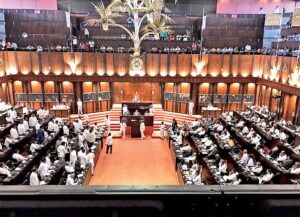
President Dissanayake’s statements also triggered internal tensions within the government. His criticism of former President Mahinda Rajapaksa, particularly regarding the cost of maintaining his official residence, caused a stir. Dissanayake’s remarks, including a demand for Rajapaksa to either pay rent or vacate the residence, have fueled political divisions within the government. This controversial statement only served to distract from the broader issues facing the nation, such as the escalating cost of living and the ongoing rice and coconut shortages.
Adding fuel to the fire, reports have surfaced that Rajapaksa has decided to vacate his government-provided residence after receiving a notice about rental payments, further complicating the political landscape. This internal conflict within the ruling party is reflective of the growing dissatisfaction and instability within the government.
Military Concerns and Accountability
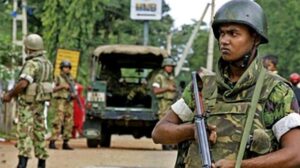
The ongoing investigation into the missing weapons and the rise of gun violence is casting a shadow over the country’s security forces. The Army Chief, Lt. Gen. Lasantha Rodrigo, pledged appropriate action against those responsible for the theft of the weapons, including military personnel who may have been involved. While investigations continue, the lack of clear answers and the slow unraveling of the truth have left many wondering about the full scope of the issue.
The political climate is further complicated by accusations of corruption and the possible involvement of uniformed personnel in illegal activities. While former President Ranil Wickremesinghe’s government initiated police investigations into these matters, the current administration’s handling of the situation raises concerns about accountability and the political influence that may be at play.
The Government’s Foreign Relations and Economic Struggles
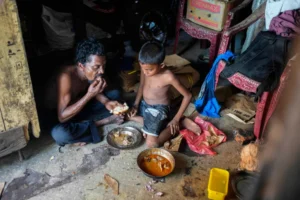
As the government grapples with domestic issues, it is also seeking to strengthen its foreign relations to address the ongoing economic crisis. President Dissanayake’s visit to China earlier this month, followed by discussions on securing fuel at lower prices, highlights the government’s attempt to leverage foreign investments to stabilize the economy.
However, Dissanayake’s previous criticisms of Chinese and Indian investments, particularly in key infrastructure projects, have raised eyebrows. The President’s shift in stance—calling for more Chinese investments—reflects the pressures of governing in a globalized economy, where political rhetoric must often be adjusted to meet economic realities.
The government’s decision to strike new deals with China, including the establishment of an oil refinery in Hambantota, has drawn criticism from various quarters. Many view these agreements as a form of barter, potentially compromising the nation’s sovereignty in exchange for financial aid. Despite these concerns, the government has pressed forward with these investments, signaling a shift in its economic strategy.
The Role of Public Protests and Accountability
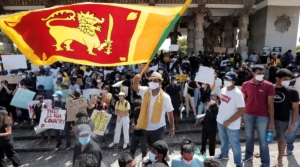
The Aragalaya protests, which were a significant part of the political landscape in 2022, played a key role in shaping the public’s perception of the government’s ability to address the country’s economic challenges.
The protests were driven by the public’s anger over the economic crisis, and their outcome has influenced the current government’s approach to governance. However, the question remains: did the protests contribute to the permissive atmosphere that allowed for the theft of weapons from military camps?
As the government faces mounting challenges, it must also contend with the growing sense of dissatisfaction among the public. The recent speeches and political maneuvers, while aimed at diverting attention from these issues, have only served to expose the internal divisions and frustrations within the ruling party. The government’s failure to address the core concerns of the population—rising prices, shortages of essentials, and political instability—has led to increased unrest.
The Way Forward: Balancing Politics and Governance
In the face of these challenges, Sri Lanka’s ruling government must carefully navigate its political landscape. The President’s controversial statements and actions, including his attack on Mahinda Rajapaksa, have only deepened political divisions, while the country’s economic crisis remains unresolved.
The rising gun violence, coupled with a lack of clear accountability for the missing weapons, has left the public questioning the government’s ability to provide security and stability.
As the government prepares for local elections and continues to engage in foreign diplomacy, it must address the underlying issues that have led to widespread disillusionment.
Without a clear plan to address the nation’s economic and security concerns, Sri Lanka’s political future remains uncertain. The government must act swiftly to restore public trust and demonstrate that it is capable of fulfilling its promises, or risk further alienating the population and facing a more turbulent political future.

